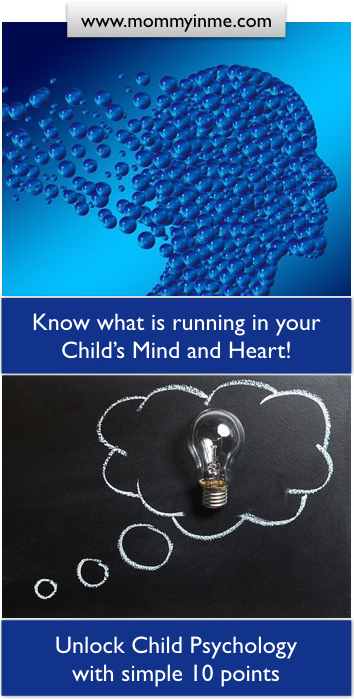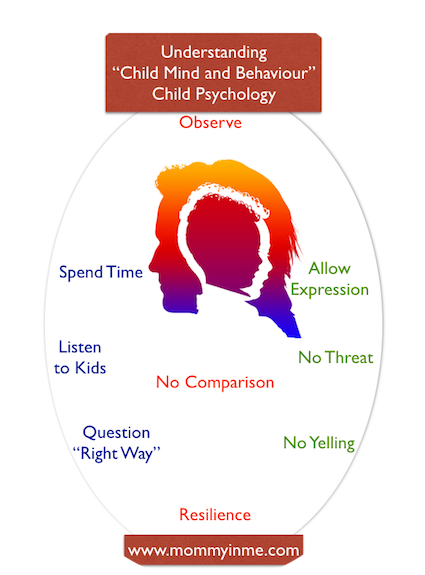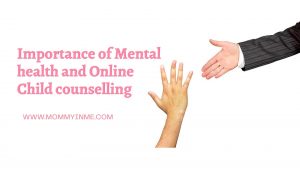After getting a glimpse of Factors affecting a child’s behaviour, mind, rather Psychology, let’s hop onto how, you, as a parent can understand what a child feels and thinks.
Here are 10 points helping you to understand Child’s Psychology in a very simple manner :
1.Observation :
Observation is the key to understand a child’s mind and heart. We as parents, need to notice how child expresses, reacts, feels when s/he eats, plays, sleep, communicates. We need to be attentive and show our interests in what our kids do. Make out a list basis your life’s routines and child’s age. Sometimes, even observing other kids of the same age as your child can help you learn a lot about a child’s psychology. But be aware, never compare any child and don’t try to figure out who is better. This study is just to help you know what are the weaknesses your child may display and gauge on the points which you need to work on. While something can be a strength for one child, it can be a weakness for another.
Example: If you find 4 kids out of 5 are climbing the rock with a rope, while one does not, it calls for an understanding. Is there any physical concern or fear or a pain of losing the battle, that is preventing him/her to climb? This is where we need to understand a child’s Psychology and solve the problem.
Just walk along some of these questions :
- Is my child social? Does he loves sharing things with his friends? Expect the behaviour as per age. A 2 year old toddler may be too possessive for his toys, but we can expect a mutual sharing from a 5 year old child.
- How does s/he react when in public? Specially, if s/he is presented with something they dislike, how do they react?
- What are the reactions while getting up and leaving for school? Are they crying not to go or are they enthusiastic to meet and learn something new?
- Do they like to engage in household chores with the family? Or they just want mama to complete all the task? If so, then the family as a whole should involve themselves in all chores and set an example for the child.
- How does your kid reacts when s/he is served with food they don’t like?
- Is your child’s sleep comfortable or s/he has jitters and frequent wakes many a times?
2. Quality Time and Full Attention:
We all are becoming more or less a juggler, managing office, house, kids, social and personal lives all simultaneously. Specially, I think Social media has a lot to be questioned. I’ve seen parents browsing their phones while talking to their child. While the child tries to make an eye contact, parent’s eyes are deep buried in the mobile screen. When a kid is growing up, spending “Not just Time” but “Quality time” is of utmost importance.
- When you are with your child, forget those electronic gadgets and just be what you are for your child.
- Play, Laugh, sing, speak, read out stories, dance with your child.
- What was the last time you sat and spoke to your child of what they conversed with their friends during Lunch or what did they speak with their Bus driver?
These are just everyday conversations. There will be no need to ask specifically if you spare that quality time with your kid. S/he will slowly tell themselves all about this. And have faith, this is what I have observed with my kid. We have minimum 3 hours daily for ourselves. These are the durations when we read stories, Play, do art and craft, discuss the happenings at school, have discussions around his teachers, friends. Those are the moments when my son gets excited and shares with me his thoughts. He questions me to all what he doesn’t have answers for when we talk or do some craft.
These small moments with no hindrances are beautiful to understand a child’s mind. When you ought to be with your child, just be with him/her. Forget about other commitments or cooking or anything else. If you will break the spree, its certain you will miss upon some important facts which your kid would have told you. When you are with your child without any distraction, a child feels safe and gets the desired attention. This in turn allows a child to open up more and discuss various things.
3. Be a good Listener :

Talking is good but Listening is effective. Initiate a conversation and silently listen to what your child has to say. Allow him to frame stories and use his imaginations. Excite him by acknowledging that you are listening to him. A child might not be able to express completely, at least till early childhood, but listening to a child encourages him to tell you his story/feelings. While your child is speaking, notice :
- Child’s Expressions
- Emotions in the tone
- Vocabulary s/he is using
- Creativity involved
- Body language your child is using
Let them know that you are seriously listening to their talks and feelings. Don’t interrupt much in between, so that they can continue their stories. From that listening, you can deduce so much, I bet on.
4. Question in a right way :

The beauty of question lies in how it is Questioned. While the same question may trigger anger, if done in a correct manner, it may delight a child to share his thoughts.
Some Examples:
- When you are going to buy a pair of shoe for your child, instead of asking do you like this shoe, ask him beforehand what kind of shoe would he like to buy? That would give him a bigger window to answer rather than saying just a yes or a no.
- Don’t ask did you play on slide today, instead ask them what did they play today?
The essence is, allow them to answer in not one or two words but let them frame a story around the topic. And while s/he is answering, do not interrupt. This will help you understand your kids mind in a great way.
As kids reach their preschool phase, their curiosity increases as they see new things in the surroundings. At this age, kids get too inquisitive and ask numerous questions and expect to get an answer. This is a positive sign, don’t stop your child from asking. Rather, answer their questions and if you can relate them with other objects, some moral values, that would be a bonus.
5. Develop grit and Resilience :
Developing grit in kids is so important for their EQ. As parents or caretakers, we ensure a complete boundary of protection for our kids. They fall and we are there to pick them up. We see our child crying for something and we are there to give them what they desire. Little sweat and we feel pity for them. We always try to shield our kids from “Failures” and just want them to succeed ignoring failures.
But this is not correct parenting. We have to ensure that they “Fall” & “Rise” up again rather than shield them from falling altogether. A bad incident while playing some game in our lives should not deter a child’s gaming experience. Experiences make us experienced and not paranoid. Firmness, Courage and Elasticity towards various situations are built in via encountering failures and having the zeal to triumph against failures. And, this has to be built in right from 2years, when kids have started exploring their social surroundings. Supports reduce uncertainty and stress and helps in a positive child psychology. One of the research findings have shown that close emotional relationships and supporting social community help develop resilience.
- Allow your baby to fall and get up all by himself. Don’t pity over a small fall.
- Don’t try to be a counsellor when your child is with his friends. Let them make their own space.
- Play football / badminton or any sport with your kids in a true manner. Don’t lose to your children always. Your child will never reach his/her true potential then. Let them struggle hard to attain that victory.
- Applause for once but not always for any task being done. Consistent cheers will make your kid habitual of ovations.
- Create Situations. If the path goes too straight, create some twists and turns. Create challenging circumstances and provoke them to complete it. That will make kids more aware of gaining extra skills & confidence to win over others with some struggle.
6. Don’t yell and snub :
I would say, Stop Yelling, Start Understanding! A yelling, traumatic, negative atmosphere at home or school can lead to unnecessary stress, emotional burdens, counter aggression from a child. Further, don’t snub your child’s voice all the time. Don’t make him feel that his opinions are incorrect and not required. Stressful experiences have resulted in attachment and adjustment disorders, Psychiatric disorders as dissociative states, mood disorders, personality disorders in adulthood.
- If you see your child in stress, It is necessary to ask direct questions about their stressful/traumatic experiences.
- The best approach for young children to allow their expression by using play and drawing as tools. They express their feelings by re-enacting a stressful event in their play or they use them in their drawings.
- Some kids also have bad sleep, frequented by nightmares. Have a close watch at the situations, drawings, roles being enacted and you’ll know the outcome.
7. Don’t promote Threat :
Threat always leads to lots of stress, anxiety in the budding minds of children and it can anytime lead to an anxiety disorder. Anxiety disorders are the most common in children and it impacts a child’s psychology adversely.
I’ve come across so many instances wherein I hear parents saying, eat your sandwich else that monster / bearded stranger will pick you up. Don’t ever do that. You might feel that your child is being afraid and eating that sandwich. But this fear will convert into a threat, an anxiety and severely impact psychology as your child grows.
There are different sets of anxiety basis the age :
8m to 3 years : Separation, strangers
3 to 6 years : Darkness, Animals, Monsters, Ghosts
6 to12 years : Performance , Social
12 to 18 years : Social anxiety, Adulthood, Illness, Relations
Its always best to speak about these anxieties in open and have soft discussions about them. Try removing those anxieties.
8. Let them express their “opinions” :
Self – expression is a key to positive Child Psychology and a confident personality. Allow them to speak, write, draw, sing, whatever they wish to. Let their imaginations, thoughts get a canvas to be written or drawn.
Every child has a different way of expressing, what is important is that, feelings and thoughts should be expressed. Allow them to give their opinions in family discussions. If you are to buy some decor, your child’s opinion might just rock. Even if it doesn’t, a direct “No” is not good, rather one can say “Don’t you think that colour red will match the off white walls in our room? So let’s go for this piece”. Such discussions will enhance your child’s exploration and for them, their opinion was counted. From an early childhood, you can ask your child to jot down the daily events. This will not just allow them a platform to express but you can read and relate so many things in their life.
9. Stop Comparison and develop confidence :
Every child is different and unique. Forget comparing children to one another, be it siblings or friends or any. This will not just add stress to you as a parent but even make a child feel inferior. Greater levels of comparison can ignite feelings of jealousy, rebel and many such negative thoughts against the child being compared. These are all against a positive development. Instil a sense of confidence in the acts of your child. Allow him to develop his/her social circle and show confidence in their acts.
10. Attachment, Connect :
Look around in your child’s environment. Connect yourself to that. A child’s behaviour and attitude are a lot dependent on his/her environment. Be it school, house, society, parks or wherever they spend a good amount of time. If you see your child getting aggressive, you need to connect with his environment. Does any kid in the school has such attitude or is the environment at home stressed up? Develop a connection and try to resolve it.
Ensure that there has been a consistent carer in a child’s life. Mother’s should positively respond to their infants cues, encourage soothing incases of distress, enhance family’s playful interactions.
Understanding how a child’s brain works and how development goes is very important. Read research articles, blogs, pertaining to Parenting, Child Psychology. Discuss and understand different phases of a child’s growth with experienced parents.
Happy Understanding!
Love,
Jhilmil
Disclaimer : No part of tis blog may be reproduced or utilized in any form or by any means, electronic or mechanical, or by any information storage or retrieval system, without permission in writing from the blog author Jhilmil Bhansali, who holds the copyright. Please DO NOT PLAGIARIZE.






Thank you for the good advice. I am helping to raise my grand daughter who is soon to turn four. If I knew then what I know now, I am much more receptive about how the attitude, tone and actions of our entire family set the stage for her development.
I believe that as a parent you know your child better than anyone else, and this is helped by the points you have raised, but it is always nice to have a little gentle reminder on these things x
This is a great reminder for me as a parent. I like to think I know my child but these reminders really help me to understand him better.
What an awesome post and I love to read this perfect read for parents and it’s important to know your child.
This is a great post! Observation is really important. It’s easy to drive yourself crazy with worry about your kids. Stepping back and really assessing them and their behavior is really important.
Very informative post and i think this gonna help a lot of parents to know more about their kids because raising a kid not an easy thing, you’ve to prepare for everything.
This is such a great reminder to all the parents! It is important to understand the child’s psychology at a tender age and make him ready to overcome his/her fear!
love this write up! I think it’s important for parents to educate themselves on children and ‘parenting’ … I read books, talk to other parents, I even did parenting classes in hopes that the father of my kids would go with, but that’s a whole other story… Thanks to you this can be a great resource for parents looking for insight to come and read AND learn. Nice!
I have studied psychology of education for 2 years at university and I loved it so much. Your blog post remind me of those useful classes.
This is so interesting, I think my favourite point is about not yelling or belittling your child, especially in public; I used to see Mum’s do that so often when I was at the shopping mall as a teen and I always felt so sad for the child to be yelled at like that constantly, instead of shown love and how to behave more appropriately.
These are some really useful tips. Observation is always a good starting point and listening is good advice. It’s easy to be dismissive of your child’s world.
Really interesting! I dont have kids but when my friends ask me to babysit i have no clue how i should treat them! what is okay and what is not! now i have a little bit of insight!
Great to know that:). Thanks
Such a great post, especially for me having a daughter. Very informative and gives me lots to think about.
Indeed a very useful post for parents and parents to be to handle their kids in a proper way.
This is great advice. I really like how detailed you are and that you have included ages for some of your points. I was especially interested in the different anxieties children face at different ages. That is useful to know.
These are some great pointers, will keep them in mind for when i’m going to be a mommy also, sharing it with my other mommy friends ! <3
Some great parenting tips to understand the kids better! ?
This is such a beautiful post. Children need to be nurtured and given as much love and attention as possible.
So beautifully penned down. Every point is so true. We parents without our knowledge might get carried away for a minutes satisfaction for them to eat but on a long run it is a very tough thing for the children
Well I agree with most of ur points but seriously speaking being social media addict its getting difficult with me
Great post…Inspite of knowing much of it we need constant reminders.. Thanks for sharing these insights.
Safarnama @ http://www.travelwithanjali.com
I agree that it is so important that you listen to your children and let them know that you are listening to them. it can be difficult at times. but hearing and listening first is the most important thing.
Love this. Saving to read again later!
I’m so thankful I raised my kids before the age of the technology we have today. Everywhere I go I see parents with their kids and they’re staring at their phones. I hate to judge, but every time I think are they truly connected? Long ago I stopped looking at my phone at all during the day and it’s made a world of difference. Great food for thought. x
It’s very important for every parent to understand their child’s mind… loved the post
Everybody in the family must follow the pointa you mentioned above. Kids adapt easily hence its important that we watch our actions. Thank you for the wonderful article.
This post is really great and well mentioned all the points related to child psycology. Infact most of the parents do not understand psyclogy and compare kids development with other kid. that leadsto a lot of issues. Thanks for sharing
This is very interesting. I have read so much parenting advice over the years and yet I think the best advice I ever received was that nobody knows your child quite like you. I threw away the books, I stopped reading the advice, and I trusted my own instinct and judgement, and I’m happier for it.
I’m a mother of two year old and this post will help me a lot. Thanks for sharing.
Very great advice given by this post to all mommys. Its really important to know our child psychology to them better. The more we understand them the better we can guide them. Very useful tips for moms. Thanks for sharing
Understanding and dealing with child is not so easy and most of the parents ignore it. This post is very handy guide for it great read
Agree totally.. Brilliant parenting tips to understand kids better
Thanks for posting this.. it is really helpful for moms.. this would definitely help them understand and treat their kids better! ?
Captivating post!! Communication is the most important bridge between parents and kids. I lived this post as reinforced some behaviors I am doing already to understand my kids.
I agree with all your points but grit and resilience are the best ones. Totally agree with you there.
Great advice! I don’t have any children yet but I’ll use these tips when I do 🙂
These are some really useful tips. Observation is always a good starting point and listening is good advice
Thank you for sharing this advice-packed article. My favorite advice was number 5 Develop grit and Resilience. I think the information you share about letting your children fall and get back up again themselves is so important. This may be part as a parent but it is so important for the child’s development
Very nice and informative post. It is also very helpful for understanding child psychology.
Great tips! I have learned a lot and with an older child I’m glad I have made it to that age. Younger years are definitely my favorite. Patience in dealing with them is huge too.
I have a degree in psychology and I could not agree more with this post. Great reminders of how a child’s behavior is shaped by your behavior. So observe, listen, and stay calm!
This is such an insightful post. I need to learn how to be patient. Thank you for sharing this.
Love this! Learned so much from reading your work and intend to implement what I learned even today. Thank you so much for sharing!
love all your pints, espeically those scary threats. kids shouldn’t be made to fear monsters and strangers in order to behave
I love the tip about how important it is to avoid threats, in order to minimize stress. That’s a really important one to keep in mind!
Wow! Your blog is so informative 🙂
Really well laid out and explained points for all parents to understand and consider. Understanding and acting upon your child’s psychology is key to their healthy development into well adjusted and caring adults and a better society overall.
My first college degree was a bachelor’s in psychology and I always thought the discipline was fascinating. All the tips you mentioned here are really important, especially providing a wholesome, positive environment for children so they can feel nurtured and loved.
This is such a wealth of information! Being a new mom this is so helpful to me, thanks for sharing!
xx, Kusum | http://www.sveeteskapes.com
Very nice points for parents to focus on. Its so important to gain this skill of getting to know your children well, otherwise problems persist. Great Read.
This is seriously an awesome post with detailed info. Observing, spending time with the kids and listening to them is very important for Parents to understand their kids and Kids to develop a comfortness to express their thoughts and ask questions. I have seen niece saying things which we have taught when she is very young and didn’t know how to talk.
Even though I have no kids of my own I cannot speak from experience I can totally get all the points you made and agree 100%. Be observant, be a good listener, invest in quality time especially if you are a working parent,all things that matter and will help raise a healthy individual! well said!
As always you have a great post about parenting. All though all of these points should be done we have to remember that no parents can be that perfect. We all do mistake but its important not to do the same mistake twice! We parents have to also remember that no matter how tired or feed up we are with the kids (because lets be honest, that happens a lot) we only have ONE chance to raise our kids well because it might be to late before you even realise it.
Thank you for sharing. I have an 11 month and 2 year old. These tips area awesome at helping better understand the way their little brains are working!
Yes, if you take the time to listen you will be able to understand your kids better I have very active kids and I learned how to be very patience… Communicating is key.
Each parent should read a post like this. So helpful!